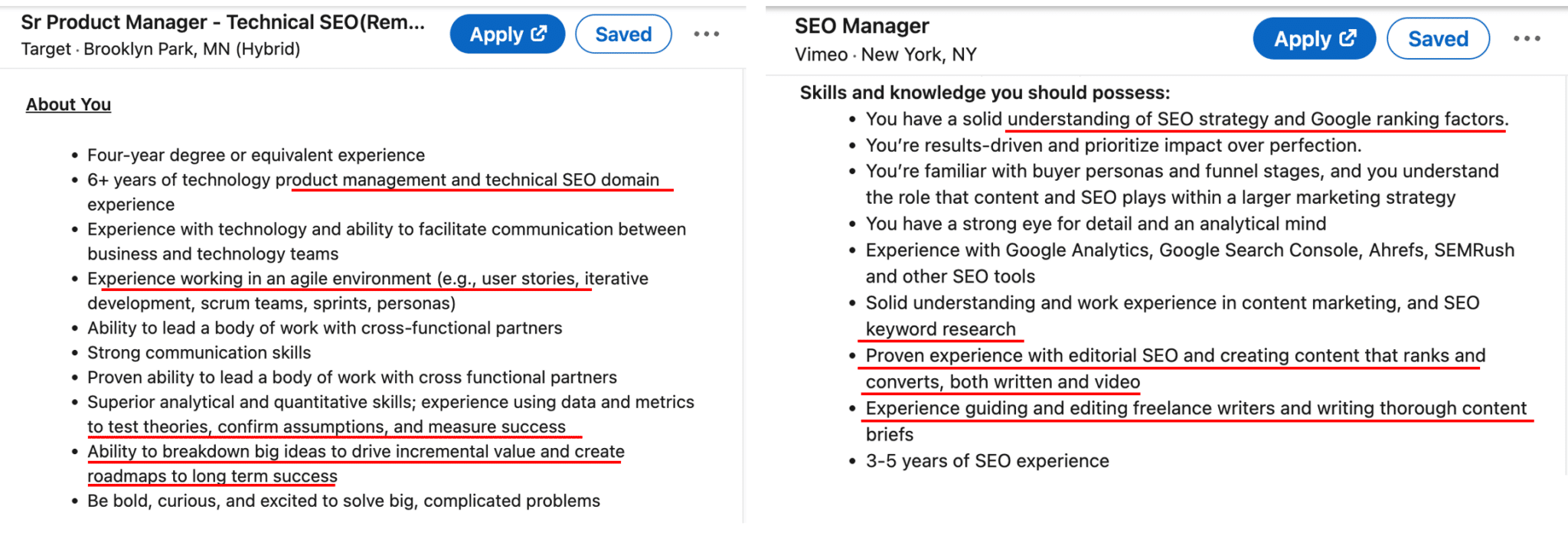SEO product manager vs. SEO manager: What’s the difference?
SEO product managers and SEO managers may sound similar, but they entail distinct responsibilities. So, what sets these roles apart?
This article covers the different expectations between an SEO product manager and an SEO manager and how each role is designed to operate inside a large organization.
Going fast vs. going far
When you’re an SEO product manager, you have a team that you collaborate with to get things done.
When you’re in an SEO manager role, you operate differently and may not be connected to the same types of resources as those in product.
While no role is better than the other, in my experience, the SEO product manager may have more access to internal engineering resources.
The dynamics of each role remind me of an African proverb, “If you want to go fast, go alone. If you want to go far, go together.”
Comparing job descriptions
Let’s look at these two roles side by side for comparison.
I found two examples of SEO job descriptions on LinkedIn:
- A technical SEO senior product manager at Target.
- An SEO manager at Vimeo.
Both companies are large, customer-facing brands.
The About section

I’ve highlighted the differences. But immediately, notice how each role is accountable for very different things.
On the left, you’ll see the product role is responsible for business outcomes.
On the right, the SEO manager is in charge of a specific SEO aspect: improving the brand’s organic visibility.
Both job descriptions show that the person needs to be a good communicator and open to collaborating with cross-functional teams.
The primary difference is operational:
- Product managers are responsible for roadmaps and backlogs that deliver business impact.
- SEO managers are often responsible for developing and guiding the SEO program. In this case, “collaborating, implementing and managing a top-level SEO program.”
In a way, both roles actually do work off of a roadmap. (What SEO professional does not have a prioritized list of technical fixes they would love to implement?)
The distinction is in the discipline of product management. SEO product managers (PMs) develop, maintain and share their roadmap with the broader organization in a more product-focused way.
This differs from how an SEO manager oversees a list of technical and content fixes and improvements.
In many ways, the SEO PM is intricately involved in quarterbacking each roadmap initiative along the way, whereas an SEO manager is largely putting SEO recommendations in motion with other teams.
Skills and knowledge the candidate should possess

This is really where we see the roles differentiate. The PM should have the expertise of a product manager and, in this case, technical SEO.
The SEO manager should demonstrate solid experience in SEO strategy, in this case, content SEO and editorial duties.
What’s interesting to me is that the product role explicitly lists the candidate should have “experience using data and metrics to test theories, confirm assumptions, and measure success.”
In practice, SEO managers do this, too, especially when we need to bring a business case to the table to prove the SEO hypothesis is worth the investment and what the incremental lift in KPIs would be.
I’m surprised a similar requirement isn’t reflected in the job description for the SEO manager.
Get the daily newsletter search marketers rely on.
See terms.
The day-to-day: Where the magic happens

Here’s where things diverge. The big differences between an SEO PM and an SEO manager are product roadmap ownership and operational function ownership.
SEO product managers own a roadmap of features and fixes where the initiatives range from ad hoc technical fixes (bugs) to building features that improve the foundational aspects of SEO, such as:
- Internal linking.
- The amount of content on the site.
- Googlebot’s ability to crawl and index the site.
- User experience.
- Speed and core web vitals.
The primary aspects of an SEO product manager role are:
- Areas of responsibilities.
- Operational function (a functional member of an agile team).
- Ability to write technical requirements as SEO requirements.
- Documentation.
Let’s look at these a bit more closely.
Areas of responsibilities
Product managers often own an aspect of the website or customer experience (what’s referred to in the job description as “leading a product”).
On large ecommerce sites, this covers areas like on-site search, cart and checkout, user-generated content (UGC), personalization/loyalty, the brand’s app, and SEO.
Another differentiator for product managers is being the “voice of the product.” This means having a point of view on why one feature should be prioritized over another (and knowing the data that backs it up).
What’s not said enough is that SEOs, especially those in product management positions, fundamentally understand their two primary customers are search engines and humans visiting the website.
Their SEO knowledge and expertise (translated into requirements) help make a website with products or visual content discoverable to both audiences.
Search engines are like a small child; they must be told everything.
Operational function as a functional member of an agile team
For context, project management methodologies such as Agile, Lean and Scrum are ways of operating and collaborating across multiple teams.
While an SEO manager is not an integral part of the agile process by design, an SEO product manager is.
The challenge SEO managers often face is actually getting SEO priorities onto a roadmap as they’re essentially on the outside of this process looking in.
In this case, the SEO manager role is expected to operate in such a way that they develop and oversee a content SEO strategy using keywords and optimization plans in addition to supporting “product releases… as needed.”
There’s exposure to the product leads, but overall, the role seems to be one of an individual contributor.
Pro tip: If you ever interview for this type of role, ask questions to understand if it has resources like direct reports or if it functions more independently.
This can help you determine what type of team dynamic you’re coming into or if the expectation is for you to build one out over time.
Ability to write technical requirements as SEO requirements
This is where fixes and updates are released to the production site.
All product managers, regardless of whether or not they are an SEO, are in a position to write technical requirements for engineering teams regarding how features get coded on the site. Therefore, they can directly impact SEO.
This is why we say the SEO team does not solely do SEO. Any team member touching the website contributes to SEO.
Furthermore, what’s not obvious is where the execution takes place.
Product managers – through the rituals of agile product management – are inherently closer to the process of:
- Writing technical requirements.
- Prioritizing upcoming work in the sprints.
- Collaborating with other product and delivery teams to launch features and implement improvements.
SEO managers do not operate this way, and I think that level of detail and involvement in the process is missing in the equation of prioritizing SEO work.
Create and maintain documentation (features, processes, etc.)
Since product managers build things in collaboration with other teams, they’re the owners of creating the “user manuals” for the features and functionality that get developed.
A few types of documents are specific to what a PM would be responsible for creating and maintaining.
In most cases, SEO managers create documentation reporting on KPIs and/or outlining SEO recommendations such as:
- Writing QA test scripts.
- Providing specific technical Google Developer Guidelines and best practices or a quick reference sheet with high-level search data for teams leveraging keyword trends and topics.
Product documentation is more comprehensive for a few reasons.
Since the audience of such documents is much broader than just outlining technical SEO recommendations for engineers, it contains sections detailing what’s called “Business As Usual” (BAU) – referring to which business operations teams or automated jobs support the feature functionality.
This type of holistic business documentation is championed by product managers and intended to be a resource for transferring institutional knowledge and work.
Salary

This is pretty straightforward because these roles provide at least the target salary range. Admittedly, these ranges are very broad.
It’s nice that a range is listed, but it’s still challenging for the candidate to know where they realistically fall on that pay scale.
Everyone wants to be at the highest end of offered compensation, right?
A word on career trajectory for SEO PMs
SEO skills matrix resource
Here’s the thing: career success is how you define it. It’s never a straight line.
As Tom Critchlow put it, they often only make sense in hindsight.
The SEO Skills Maturity Matrix is a fantastic complementary resource to help any SEO navigate and, at least, attempt to plan on how they want to invest in their career development, whether agency or in-house.
Ultimately, exposure to both makes you a more well-rounded candidate and better able to self abscess which environment you liked best and therefore want to pursue.
SEO product management is an evolving role and career. Keep an ear to the ground for online courses related to this topic. I suspect more practicing professionals will share their knowledge digitally through learning platforms.
Here are some resources related to SEO product management:
- Getting Tech SEO Implemented, Areej AbuAli
- The SEO Sprint, Adam Gent
- Product-Led SEO, Eli Schwartz
The linchpin to growing your organic search efforts
Before SEO managers and SEO product managers existed, it’s anyone’s guess whether anyone was watching over a company’s organic traffic and revenue growth.
Yet today and beyond, these roles are poised to become the strategic linchpin to nurturing and growing organic traffic and revenue for any business.
If you are an SEO manager or director, and in a position to build out your team and you don’t have an SEO PM on your team, treat yourself and get one.
If you’re an SEO PM inside your organization, make friends with other PMs, learn more about what makes a great product manager, and share your SEO wisdom.
SEO is a skill learned through experience, experimentation and shared knowledge.
It’s your job to educate and elevate those around you with your unique skill set to delight search engines and humans alike.
The post SEO product manager vs. SEO manager: What’s the difference? appeared first on Search Engine Land.










Recent Comments